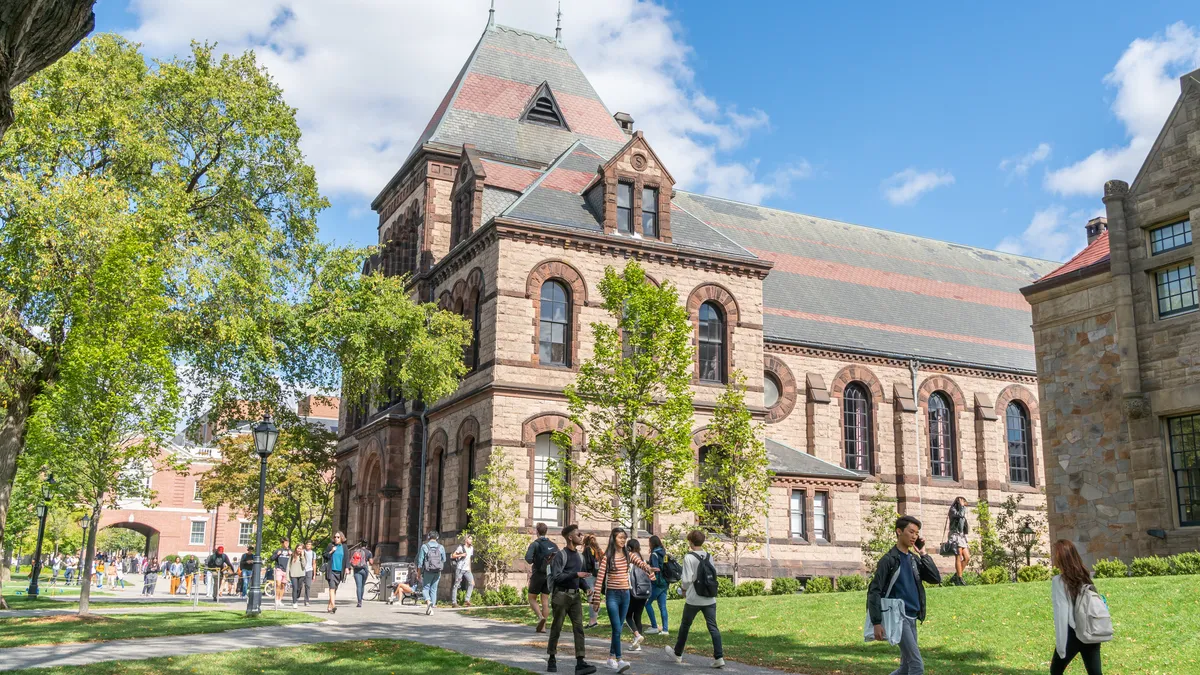Attention to non-academic qualities has driven a variety of changes to admissions policies over the last decade. An interest in a student’s capabilities beyond test scores and grades has caused admissions offices to adapt test optional approaches, raise the value of resume items such as extracurricular activities and leadership or collaborative skills and shift to “holistic” approaches that they say equally weigh non-academic qualities.
While schools perhaps can’t quite prove these attributes improve prospects for retention (no such data is available), there is renewed effort to give them even more weight.
“I strongly believe that non-academic, character-related qualities will matter more going forward and will have a systemic place in the review process by 2025,” says William Conley, vice president for enrollment management at Bucknell University.
Conley says such criteria is the next “democratic frontier” as demographics change and as colleges recognize their value because employers demand them in new employees. But he is quick to point out it is hard to know whether a focus on them will improve retention.
But there is still a debate about how colleges can effectively measure these factors, how much they should count, whether they improve retention — and even just what they are.
Reports cite character traits
Policies putting greater attention on non-academic characteristics got a big boost in 2011 when some 250 officials from top schools met at University of Southern California and developed an exhaustive report critical of the college admissions process and calling for changes.
The report claimed the system “distorted student relationships with learning” and reinforced a self-serving “image of selectivity.” It also said existing admissions policies developed a “cynical attitude in students that gaining admission to a selective institution is an end in itself rather than the beginning of an educational journey,” noting that such an attitude “gives rise to widespread cheating and gaming the system in high school while contributing to a weakened demand for effective teaching and a devaluation of learning in college.”
That report went on to call for admissions offices to use more than grades and test scores as they evaluated students, and suggested that schools “take the risk of admitting more students who show educational promise outside the standard metrics used to gauge institutional selectivity.”
Some experts say the conference and report did not have much long-term effect on college policies. But Robert Massa, senior vice president for enrollment and institutional planning at Drew University, thinks that it contributed to an awareness among admissions offices that more heavily weighing character and other non-academic factors should be an important goal and can improve the chances enrollees will thrive and succeed.
“Very often in college admissions we look at success as generating applications, meeting goals and diversifying the student body,” he says. “But really our success ought not to be measured just in numbers, but in the quality of students we are bringing in and how they reflect what we stand for.”
Massa also believes that beyond those principled reasons, schools will find balancing these characteristics with academic success will pay off — and that as chairman of Drew’s retention committee, he regularly sees that students with the right personal characteristics are more likely to stay in school.
“Perseverance, diligence, self discipline, determination, decency and kindness to others — these types of traits help students adapt to their environment, deal with setbacks, overcome frustrations, relate to others and enjoy being with them,” he says. “Students who are not determined to make things work, who get easily frustrated and who have a difficult time taking responsibility for their own happiness are more likely to drop out of school than those who exhibit the opposite characteristics.”
Massa is co-founder of the Institute on Character in Admissions, a two-year-old organization that includes representatives from top national schools and higher education organizations with a goal of developing strategies and experiments that elevate character attributes in the admission equation.
That group generally defines these qualities as character attributes, but they are often described in other ways. In a 2015 report supporting such skills in the admissions process, the National Education Association listed self-control, persistence, grit, optimism, curiosity, conscientiousness, social fluidity and self-confidence as the important personality and motivational habits that “are critical to academic success.”
“Mastery of such skills has proven predictive of future academic success, without such skills, changes in cognitive ability may be unlikely,” the report notes, citing supporting research. “Growth in non-cognitive skills has been tied to increases in course grades and future educational attainment.”
Another recent report from Hamilton Project, an economic policy branch of the Brookings Institution, is structured around seven supportive facts about “soft skills.” It notes that employers regularly report they need these skills and reward employees for them. The report says they are “integral to educational performance and labor-market outcomes,” claiming research shows those lacking these skills are about one third as likely to complete post-secondary education as those shown to have them at the highest levels.
“Non-cognitive skills … predict college readiness and completion – including resilience, persistence and self-control — that are also consequential for the labor market,” the Hamilton Project report states.
While Conley notes that he does not think there is yet definitive research showing they improve retention, nonetheless at Bucknell admissions counselors carefully assess each student on a battery of personal characteristics. His office reviews students based on leadership, determination or grit, goal setting, resiliency, self regulation and an ability to work within a system and handle conflict.
Bucknell’s list has been seen by other experts as comprehensive, though some would add a few other items. An Australian study of student success based on similar characteristics noted that “conscientiousness” was the more significant than intelligence in determining success. It also found “openness to experience” was the characteristic most like to predict creative achievement and thinking, and “intellectual curiosity” and “open mindedness” has been listed by other researchers. “Resilience” seems to be on every list, and experts have repeatedly shown it is directly linked to success.
The Australian study also found that self assessments were valuable in determining these qualities in a candidate, but that reports from other people who knew about a student’s personal characteristics were almost four times more accurate than intelligence tests in predicting college success.
Other schools also are having their admissions assessment material reviewed by experts to determine ways it can better tell them more about a student’s non-academic qualities.
Kristina Wong Davis, vice provost for enrollment management at Purdue University, says the school considers these traits more than just academics.
“There is no one attribute, characteristic and trait that we are looking for. When we conduct a holistic review, we mean it in every sense,” she says. “We read to achieve a sense of who this student is and if the student would make a good member in the academic, social and cultural environments on our campus. The review is about identifying those students who will be successful on our campus in all aspects of the experience they will receive.”
Character criteria implementation
Massa says shows a number of schools have taken steps to make these characteristics part of their admissions criteria, including:
-
Amherst University prioritizes how students rejuvenate after a change, their depth of commitment in activities and their “bridge building” capabilities.
-
Carnegie Mellon University established protocols and criteria for each applicant, scored from 1 to 4 for leadership, service, grit and other characteristics.
-
The University of Denver identifies evidence of resilience/perseverance, and has admissions representatives use a rubric for findings and assign a score.
-
Massachusetts Institute of Technology reports that representatives look carefully at attributes such as persistence, organizational skills and resilience that predict academic success and match MIT’s culture.
-
The University of Rochester checks non-cognitive scores at every level of reading, and uses a supplemental essay question that focuses on the impact students have had in their community and their personal values.
-
Santa Clara University expects a year of substantive community service or engagement, and considers ethics and concern for others.
-
Swarthmore College added “flags” in its admission process for specific characteristics, seeking “strong community members with empathy” who “look to find solutions in a collaborative way.”

















